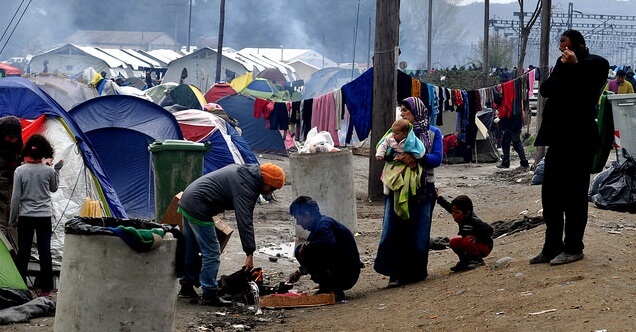Fires in the severely overcrowded camp on Samos island destroyed the homes of hundreds of people following disputes between camp residents. The plans to evacuate thousands of vulnerable people from Moria and other island camps to the Greek mainland has been halted reportedly due to local protests and fears over COVID-19. Ten European cities have volunteered to receive unaccompanied children from the Greek island camps and the Greek Turkish border.
Following a recent fire that left the Vial refugee camp on Chios island severely damaged, two fires broke out after internal disputes in the massively overcrowded camp on Samos with a capacity of 650 people and housing 7,000 people. Field coordinator on Samos for Doctors Without Borders (MSF) Stefan Cordes confirmed that 500 people were left without shelter after the fires and stated to Al Jazeera that: “They don’t have access to hygiene, water or good food. This makes their lives really difficult. The government and the European Union don’t take care of these people, who are here for a long time”. Austria has signed an agreement with Greece to deliver 181 containers over the next two years for accommodation and mobile healthcare facilities on the Aegean islands with priority given to Samos after the incidents. The Swiss Guido Fluri Stiftung in collaboration with the German Pro Asyl Foundation contributed 200,000 Euros to a hospital in Mytilene in support of local residents as well as migrants and refugees on Lesbos.
The transfer of 1500 people to the mainland scheduled for April 25 from Moria camp, where a recent gun assault marks the culmination of intimidation and attacks on residents and food and water shortage now adds to the desperate situation for the more than 18,000 people it hosts, has been halted or delayed. Reportedly the plans to evacuate between 2000 and 2300 vulnerable people from the island camps were deferred after protests by local residents and authorities. According to Greek Minister of Immigration and Asylum, Notis Mitarakis difficulties in securing health requirements within mainland camps also contributed to the decision to stop the process.” The Minister has announced a plan to bring down the number of reception facilities from 93 to 38 in 2020, to includes hotels and other alternative accommodation.
Ten European cities including Amsterdam, Barcelona and Leipzig are calling on their national governments to ease the humanitarian crisis unfolding on the Greek islands and have offered to host relocated unaccompanied children from the island camps and from the Turkish border. Germany and Luxembourg have been the first of ten countries to deliver on promises to receive 1600 vulnerable children from the island camps hosting a total of more than 5000 children but not all governments are ready to offer or accept relocations. Deputy Mayor of Amsterdam Rutger Groot Wassink is disappointed with the Dutch governments reluctance and stated: “It’s not that we can send a plane in and pick them up, because you need the permission of the national government. But we feel we are putting pressure on our national government, which has been reluctant to move on this issue.” Seven of the ten cities are located in countries that have already pledged relocation places. Despite offers of help from 40 local authorities in the Netherlands the government is adamant that no children will be taken to the country and offering instead support in Greece.
The German NGO Mission Lifeline has raised 55,000 euros to be able to fly 150 people from Lesbos to Germany awaiting only permission from the Interior Minister. Spokesperson Axel Steier stated: “With this sum, one could finance two Boeing 747–300 flights and get around 150 people from the Moria refugee camp in Lesbos…The association has a total of 110,000 euros available for the planned construction of a civil airlift between Lesbos and Berlin.”
For further information:
- ECRE, Greece: Unrest Amid Intensifying Corona Threat, ECtHR Orders Measures for Vulnerable Groups, April 2020
- ECRE, Greece: 1000 Vulnerable People Evacuated, Relocation of Children Started, Asylum Procedures Suspended, Renewed Tensions at Turkish Border, April 2020
- ECRE, Greece: Still no Access to Asylum, Second Camp Quarantined, First Relocations Ahead, Push Backs to Turkey, April 2020
- ECRE, Greece: Parliament Ratifies Emergency Decree Amid Intensifying Critique, March 2020
- ECRE, Greece: Fire and Virus Fear in Moria, 450 People Detained on Vessel Moved to Closed Camp, March 2020
- ECRE, Violations Continue in Greece, EU Says Asylum Procedures Cannot be Suspended, March 2020
- Organisations in Greece, Joint Statement: “Protect our laws and humanity!”, March 2020
- ECRE, Weekly Editorial: EU is Crossing the Red Line by Preventing Refugees from Crossing its Borders, March 2020
- ECRE, Greece: Situation in Lesvos Intensifies after Police Crackdown on Protesters, February 2020
- ECRE, Greece: Nationality-based Detention in the Moria Refugee Camp, January 2020
- ECRE, Serbia Shows European Solidarity in Greece – France Follows up on Mixed Promises, January 2019
- ECRE, Greece: Government Hit with Interim Measures and Introducing New List of Safe Country of Origin, January 2020
- AIDA, Country Report Greece, 2019 Update
- ECRE, France to Assist Greece Where Situation Continues to Worsen, December 2019
- ECRE, Greece: Six People Found Dead in Evros Region while Authorities Prop Up Border Security, December 2019
Photo: (CC) ChadBriggs, March 2016
This article appeared in the ECRE Weekly Bulletin . You can subscribe to the Weekly Bulletin here.

